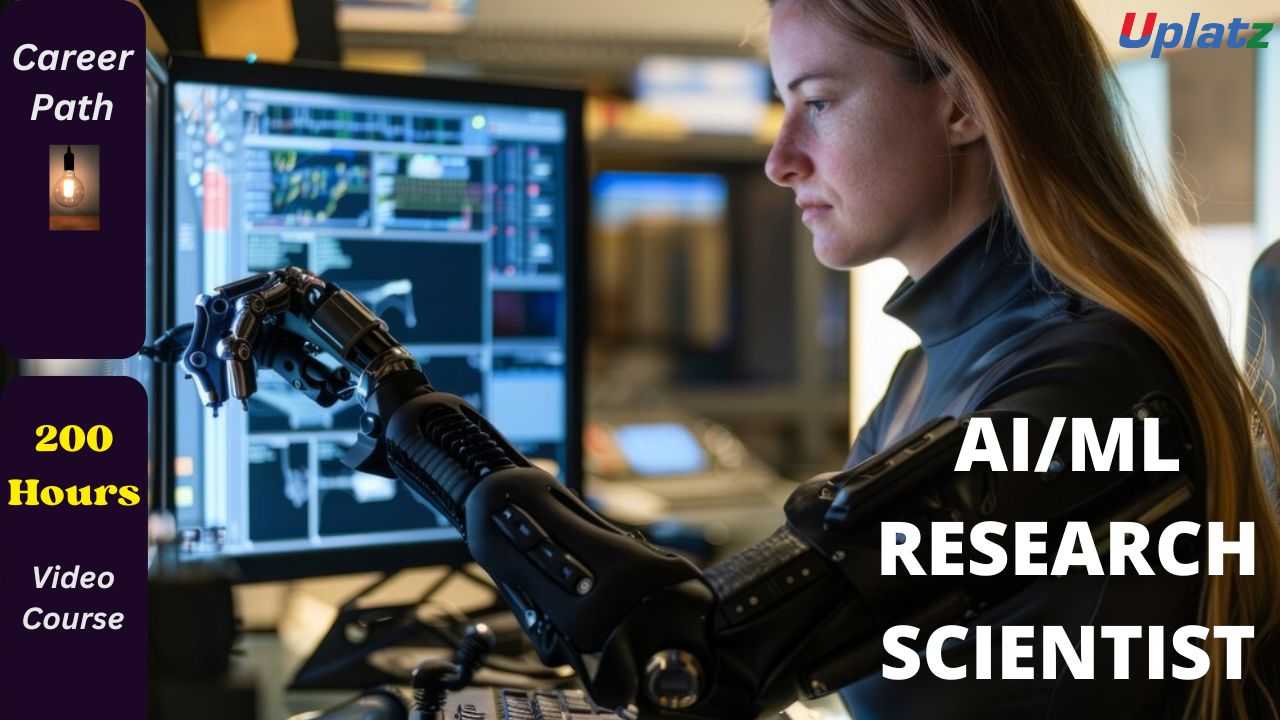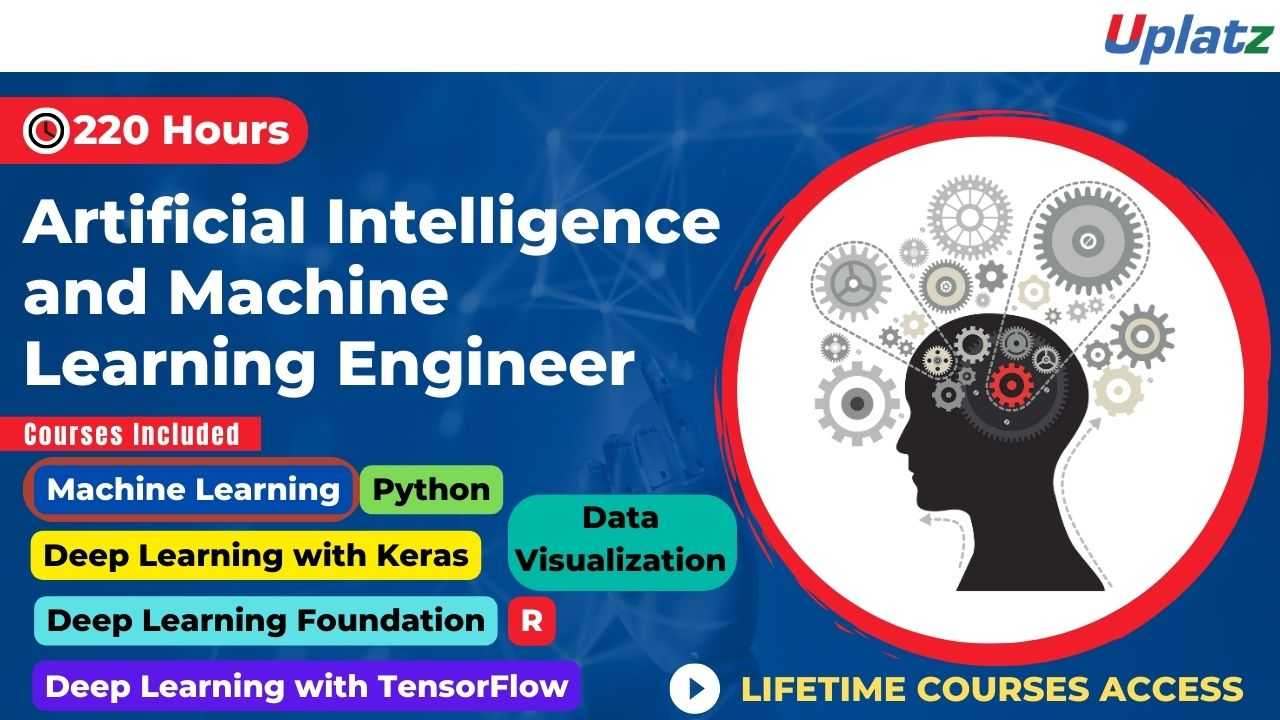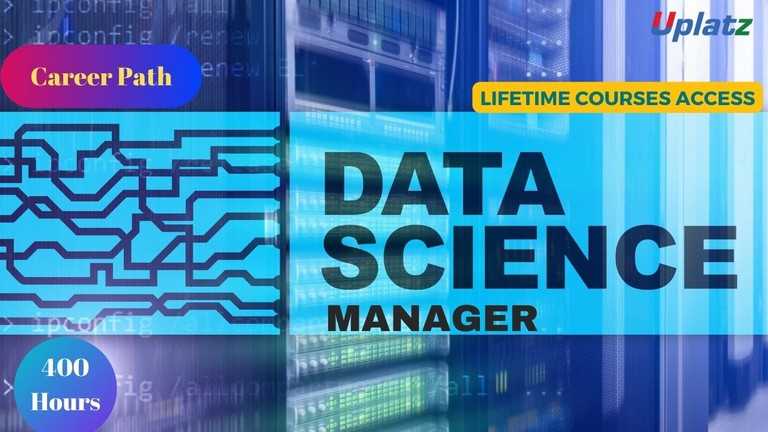Career Path - Machine Learning Operations (MLOps) Engineer
Build a rewarding MLOps career by mastering model deployment, monitoring, automation, and ML infrastructure for real-world impact. Price Match Guarantee
Full Lifetime Access
Access on any Device
Technical Support
Secure Checkout
Course Completion Certificate
Price Match Guarantee
Full Lifetime Access
Access on any Device
Technical Support
Secure Checkout
Course Completion Certificate
-
BUY THIS COURSE
-
 91% Got a pay increase and promotion
91% Got a pay increase and promotion
Students also bought -
-

- Career Path - AI/ML Research Scientist
- 200 Hours
- USD 45
- 368 Learners
-

- Career Path - Artificial Intelligence & Machine Learning Engineer
- 220 Hours
- USD 45
- 5212 Learners
-

- Career Path - Data Science Manager
- 400 Hours
- USD 45
- 966 Learners

Machine Learning Operations (MLOps) Engineer – Self-Paced Online Course
Advance your career in the fast-growing field of MLOps with this comprehensive training designed to equip you with the skills needed to deploy, monitor, and manage machine learning models in production. This flexible, self-paced program includes high-quality pre-recorded video sessions, hands-on labs, and real-world case studies to help you learn at your convenience. Upon successful completion, you will receive a Course Completion Certificate.
MLOps Engineering bridges the gap between data science and DevOps, ensuring that machine learning models are scalable, reliable, and efficient in production environments. This course covers the entire MLOps lifecycle, from model training and deployment to monitoring and governance. By mastering MLOps, you can streamline workflows, improve collaboration between teams, and ensure compliance with industry standards.
Ideal for data scientists, DevOps engineers, and IT professionals, this course provides the knowledge and practical experience needed to excel in MLOps roles across industries like finance, healthcare, retail, and technology.
Oops! No Video Subscriptions
By the end of this course, learners will be able to:
- Understand MLOps Fundamentals – Learn the core principles of MLOps and its role in the machine learning lifecycle.
- Set Up MLOps Infrastructure – Configure cloud platforms (AWS, GCP, Azure) and containerization tools (Docker, Kubernetes) for MLOps workflows.
- Automate Model Training & Deployment – Implement CI/CD pipelines for machine learning models using tools like GitHub Actions, Jenkins, and MLflow.
- Monitor & Optimize Models – Track model performance, detect drift, and implement retraining strategies.
- Ensure Scalability & Reliability – Design fault-tolerant systems to handle large-scale ML deployments.
- Apply Governance & Compliance – Manage model versioning, metadata, and regulatory requirements.
- Integrate with DevOps Practices – Collaborate with DevOps teams to streamline ML workflows.
- Troubleshoot Common Issues – Debug deployment failures, latency problems, and data pipeline errors.
- Work with MLOps Tools – Gain hands-on experience with Kubeflow, TensorFlow Extended (TFX), and SageMaker.
- Prepare for MLOps Certification & Career Growth – Build a strong foundation for roles like MLOps Engineer, AI Infrastructure Specialist, or Cloud ML Engineer.
Syllabus
Module 1: Introduction to MLOps
- What is MLOps? Key principles and benefits
- Differences between MLOps, DevOps, and Data Science
- MLOps maturity levels (Manual, CI/CD, AutoMLOps)
- Industry use cases (Finance, Healthcare, Retail)
Lab: Setting up a basic ML project with version control (Git)
Module 2: MLOps Infrastructure & Tooling
- Cloud platforms for MLOps (AWS SageMaker, GCP Vertex AI, Azure ML)
- Containerization with Docker and orchestration with Kubernetes
- Infrastructure as Code (IaC) using Terraform
- Workflow automation with Kubeflow and MLflow
Lab: Deploying a Dockerized ML model on Kubernetes
Module 3: Data & Model Management
- Data versioning with DVC (Data Version Control)
- Feature stores (Feast, Tecton) for reusable features
- Model registries (MLflow Model Registry, SageMaker Model Registry)
- Experiment tracking (Weights & Biases, TensorBoard)
Lab: Implementing a feature store for a fraud detection model
Module 4: CI/CD for Machine Learning
- Building CI/CD pipelines for ML (GitHub Actions, Jenkins, Argo Workflows)
- Automated testing for ML models (unit, integration, bias/drift tests)
- Blue/Green and Canary deployments for ML models
- TFX (TensorFlow Extended) pipelines for end-to-end workflows
Lab: Creating a CI/CD pipeline for an NLP model
Module 5: Model Deployment & Serving
- Real-time vs. batch inference
- Model serving frameworks (FastAPI, TorchServe, TF Serving)
- Serverless deployment (AWS Lambda, GCP Cloud Functions)
- Edge deployment (TensorFlow Lite, ONNX Runtime)
Lab: Deploying a model as a REST API using FastAPI
Module 6: Monitoring & Maintenance
- Monitoring model performance (Evidently, Prometheus, Grafana)
- Detecting data drift, concept drift, and model decay
- Automated retraining strategies
- Logging and alerting for ML systems
Lab: Setting up drift detection for a recommendation system
Module 7: Scalability & Optimization
- Distributed training (Horovod, Ray)
- Model optimization (Quantization, Pruning, Knowledge Distillation)
- Cost optimization for cloud ML workloads
- High-availability architectures
Lab: Optimizing a deep learning model for edge devices
Module 8: Security, Governance & Compliance
- Model explainability (SHAP, LIME)
- Bias/fairness auditing (Fairlearn, AIF360)
- GDPR/HIPAA compliance in ML systems
- MLSecOps (Security for ML pipelines)
Lab: Implementing model explainability for a loan approval system
Module 9: Real-World MLOps Case Studies
- Netflix – Personalization at scale
- Uber – Michelangelo ML Platform
- Banking – Fraud detection in production
- Healthcare – Deploying diagnostic models
Capstone Project:
- End-to-end MLOps pipeline for a real-world problem (e.g., demand forecasting, sentiment analysis)
- Includes data prep → training → deployment → monitoring
Additional Resources
- Cheat Sheets: Kubeflow, MLflow, Terraform
- Interview Prep: 50+ MLOps interview questions
- Community Access: Private Slack/Discord for peer networking
Upon completing the MLOps Engineer Career Path course, you will receive a Course Completion Certificate from Uplatz, validating your expertise in deploying and managing machine learning models in production.
This certification serves as a valuable credential to showcase your skills in MLOps, enhancing your resume and career prospects in AI and cloud computing. The course also prepares you for advanced certifications like:
- Google Professional Machine Learning Engineer
- AWS Certified Machine Learning Specialty
- Microsoft Certified: Azure AI Engineer Associate
With this training, you’ll be well-equipped to pursue official MLOps certifications and stand out in a competitive job market.
The demand for MLOps Engineers is skyrocketing as companies increasingly adopt AI and machine learning. Completing this course opens doors to high-paying roles in tech, finance, healthcare, and more. Potential career paths include:
- MLOps Engineer – Design and maintain ML pipelines in production.
- AI Infrastructure Specialist – Optimize cloud platforms for ML workloads.
- Machine Learning Engineer – Focus on model deployment and scalability.
- Data Engineer (MLOps Focus) – Build data pipelines for ML systems.
- DevOps Engineer (ML Specialization) – Integrate ML workflows with DevOps practices.
- Cloud ML Consultant – Advise businesses on MLOps best practices.
Industries like fintech, e-commerce, and autonomous systems are actively hiring MLOps professionals to ensure their AI solutions run smoothly. With experience, you can advance to leadership roles such as MLOps Team Lead, AI Architect, or Director of Machine Learning Operations.
1. What is MLOps, and how does it differ from DevOps?
MLOps applies DevOps principles to machine learning, focusing on model deployment, monitoring, and lifecycle management.
2. Explain the key components of an MLOps pipeline.
Data versioning, model training, CI/CD, monitoring, and governance.
3. How do you handle model drift in production?
Implement monitoring tools (e.g., Evidently, Prometheus) and automate retraining pipelines.
4. What tools would you use for containerizing ML models?
Docker for containerization, Kubernetes for orchestration.
5. How do CI/CD pipelines work in MLOps?
Tools like GitHub Actions or Jenkins automate testing, building, and deploying ML models.
6. What is the role of feature stores in MLOps?
Feature stores (e.g., Feast, Tecton) centralize and manage reusable features for consistency.
7. How do you optimize ML models for low-latency inference?Use model quantization, pruning, and edge deployment (e.g., TensorFlow Lite).
8. What are the challenges of scaling ML models?
Data bottlenecks, compute costs, and maintaining consistency across environments.
9. How do you ensure compliance in ML deployments?
Track model lineage, audit trails, and adhere to regulations like GDPR.
10. Describe a real-world MLOps project you’ve worked on.
Example: "Deployed a fraud detection model on AWS SageMaker with automated retraining."
1. What is MLOps?
MLOps (Machine Learning Operations) combines DevOps and ML to automate and manage the end-to-end ML lifecycle in production.
2. Who should take this course?
Data scientists, DevOps engineers, and IT professionals looking to specialize in deploying ML models.
3. Is coding experience required?
Yes, familiarity with Python and basic DevOps concepts is recommended.
4. What is the course format?
Self-paced with video lectures, hands-on labs, and lifetime access to materials.
5. Will I get a certificate?
Yes, a Course Completion Certificate is provided after finishing the course.
6. Does this prepare for certifications?
Yes, it covers topics aligned with AWS, Google, and Azure ML certifications.
7. Are there prerequisites?
Basic knowledge of Python, ML, and cloud computing is helpful but not mandatory.
8. How long is the course access?
Lifetime access to all content and updates.
9. Is there hands-on practice?
Yes, labs include deploying models on cloud platforms and setting up CI/CD pipelines.
10. What support is available?
Access to instructors, discussion forums, and additional resources.









